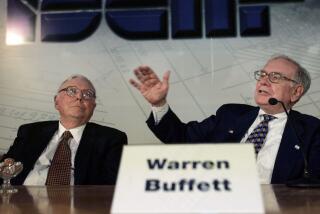40,000 New Believers Welcomed
- Share via
Investor Warren Buffett has sent Berkshire Hathaway Inc. stockholders a chatty “owner’s manual,” aimed at welcoming into the fold the 40,000 new holders who joined the ranks through the company’s recent offering of lower-priced Class B shares.
In the green-bound pamphlet, Buffett reiterates the 13 fundamental “business principles” that he’s included in Berkshire’s annual reports since 1983, along with some new comments.
And he tosses in an added principle: an explicit statement that the investing company will seek to keep the “intrinsic” and the “market” value of Berkshire shares in alignment.
“We would rather see Berkshire’s stock price at a fair level than a high level,” he writes. “Our it’s-as-bad-to-be-overvalued-as-to-be-undervalued approach may disappoint some shareholders, particularly those poised to sell,” the document says.
“We believe, however, that it affords Berkshire the best prospect of attracting long-term investors who seek to profit from the progress of the company rather than from the investment mistakes of their partners.”
Buffett noted that he and Berkshire Vice Chairman Charlie Munger can’t control the price of Berkshire shares.
“But by our policies and communications, we can encourage informed, rational behavior by owners that, in turn, will tend to produce a stock price that is also rational,” he writes.
Buffett created the lower-cost Class B shares to discourage planned third-party unit investment trusts, which were designed to let investors who couldn’t afford the sky-high price of Berkshire’s Class A common piggyback on the company’s investing performance.
The so-called Baby Berkshires were structured to trade at about 1/30th the price of the Class A shares. In the May offering, the B shares were priced at $1,110, and Berkshire A shares were trading at $33,400. On Thursday, B shares lost $10 at $1,010; A shares dropped $500 to $30,200 on the New York Stock Exchange.
In his brief treatise, Buffett tells Berkshire investors that he and Munger “hope that you do not think of yourself as merely owning a piece of paper whose price wiggles around daily and that is a candidate for sale when some economic or political event makes you nervous.”
In that same vein, Buffett says later in his latest communication that in some respects “a depressed stock market is likely to present us with significant advantages.” Among other things, he says, a downward move depresses the price the investing company has to pay for its acquisitions.
“So when the market plummets, as it will from time to time, neither panic nor mourn,” he writes. “It’s good news for Berkshire.”
Buffett concludes with a discussion of how, upon his death, his job will essentially be split into two parts, with one executive becoming responsible for investments and another for operations. Who they would be, he says, depends on the date of his death.
If the management changes were to occur on an “immediate basis,” he notes, “my family and a few key individuals know who I would pick to fill both posts.” Both executives, he notes without further elaboration, “currently work for Berkshire.”
In closing, Buffett says jauntily, “I also want to assure you that I have never felt better. I love running Berkshire, and if enjoying life promotes longevity, Methuselah’s record is in jeopardy.”
More to Read
Inside the business of entertainment
The Wide Shot brings you news, analysis and insights on everything from streaming wars to production — and what it all means for the future.
You may occasionally receive promotional content from the Los Angeles Times.










